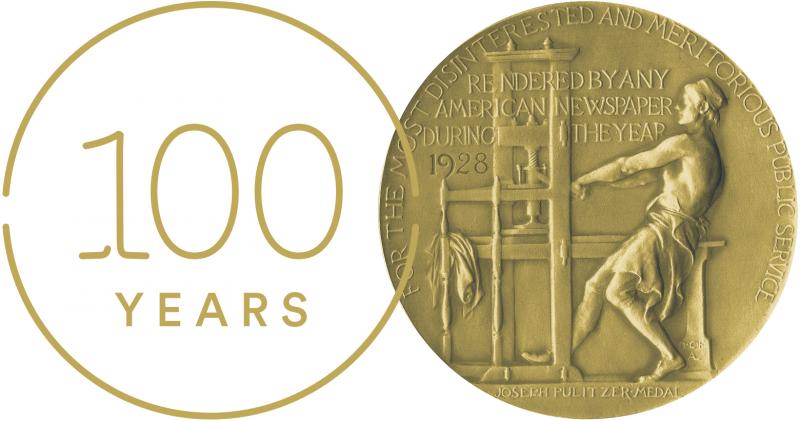100 Years of Honoring Journalism and the Arts
May 16, 2016
“Honoring excellence in Journalism and the arts, for 100 years” reads the slogan painted in gold scripted letters that greets visitors of Pulitzer Prize website. Since 1916, when the first Pulitzer Prizes were administered, this award has been regarded as the highest honor in journalism and the arts.
Started through the will of newspaper giant Joseph Pulitzer, the prize began to recognize the greatest journalistic, artistic and creative achievements of writers and artists in the US. Pulitzer himself was a journalist and started two of the most prominent newspapers of the time period- The New York World and St. Louis Post-Dispatch.
Pulitzer was an immigrant from Hungary, coming to the US in 1865 as a recruit for the Union Army during the Civil War. Originally, Pulitzer attempted multiple times to join the Austrian Army, Napoleonic Legion and British Army, but was rejected due to his poor eyesight and frail health.
Once in America after the war, Pulitzer became a well known journalist for German-speaking newspaper Westliche Post in St. Louis. Becoming very involved in politics, Pulitzer himself became a member of the Missouri State Legislature becoming a very well-known and influential democrat.
Even in his political career, Pulitzer was a known crusader against dishonest government, as well as a visionary and fierce competitor. His competitive nature led him to leave politics after the Civil War after acquiring another German-speaking newspaper, Staats-Zeitung, which he converted into the St. Louis Globe.
After selling the Globe, Pulitzer took over the Dispatch and the Post, which he merged together to become the Dispatch-Post newspaper. This newspaper dominated the Saint Louis journalist scene until Pulitzer’s editor in chief was shot to death in October of 1882.
After the death of his editor-in-chief, Pulitzer feared for his life and believed that his best option was to move his headquarters to New York City. Once in NYC, Pulitzer bought the World newspaper and transformed it into two sections; Morning World and Evening World.
Despite his newspaper ownerships and fame, Pulitzer’s health was not as great as his success. Just before purchasing the World, Pulitzer’s eyesight began to fail him, eventually causing him to become totally blind. He was 43 when he left his editorial jobs and he never returned to the world of journalism.
Upon his knowing that his health would not sustain much longer, Pulitzer drew up his will in 1904, creating the first fund for the what is now the Pulitzer Prize. He designed the award to be given in areas of literary excellence decided through a hand picked committee, which he also appointed in his will.
In his will, Pulitzer laid out directions on how to distribute the prizes. There would be specified fields in which the winners would be chosen from- journalism, letter and drama, education and a traveling scholarship. For each of these fields writers, newspaper and magazines would submit pieces which would be reviewed by his committee and out of the submissions, the winner would be selected.
The selection process for the award is the same today as it was when Pulitzer died in 1911. With the incorporation of new committee members over the years and the expansion of the fields that the award spanned with the expanding use of the internet, the prize has changed over significantly over the years, but still remained on the same principles on which it was established.
The 2016 Pulitzer Prize Winners:
JOURNALISM
Public Service – Associated Press
Breaking News Reporting – Los Angeles Times Staff
Investigative Reporting – Leonora LaPeter Anton and Anthony Cormier of the Tampa Bay Times and Michael Braga of the Sarasota Herald-Tribune
Explanatory Reporting – T. Christian Miller of ProPublica and Ken Armstrong of The Marshall Project
Local Reporting – Michael LaForgia, Cara Fitzpatrick and Lisa Gartner of the Tampa Bay Times
National Reporting – The Washington Post Staff
International Reporting – Alissa J. Rubin of The New York Times
Feature Writing – Kathryn Schulz of The New Yorker
Commentary – Farah Stockman of The Boston Globe
Criticism – Emily Nussbaum of The New Yorker
Editorial Writing – John Hackworth and Brian Gleason of Sun Newspapers, Charlotte Harbor, FL
Editorial Cartooning – Jack Ohman The Sacramento Bee
Breaking News Photography – Mauricio Lima, Sergey Ponomarev, Tyler Hicks and Daniel Etter of The New York Times
and
Photography Staff of Thomson Reuters
Feature Photography – Jessica Rinaldi of The Boston Globe
LETTERS DRAMA AND MUSIC
Fiction – The Sympathizer by Viet Thanh Nguyen (Grove Press)
Drama – Hamilton by Lin-Manuel Miranda
History – Custer’s Trials: A Life on the Frontier of a New America by T.J. Stiles (Alfred A. Knopf)
Biography – Barbarian Days: A Surfing Life by William Finnegan (Penguin Press)
Poetry – Ozone Journal by Peter Balakian (University of Chicago Press)
Nonfiction – Black Flags: The Rise of ISIS by Joby Warrick (Doubleday)
Music – In for a Penny, In for a Pound by Henry Threadgill (Pi Recordings)





